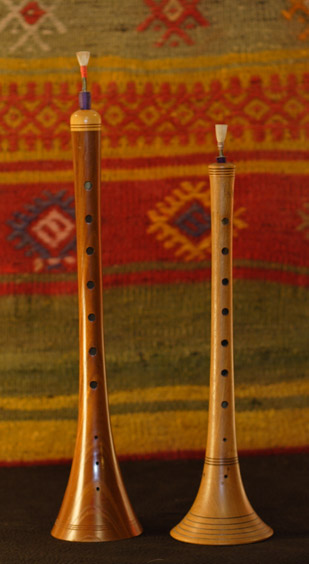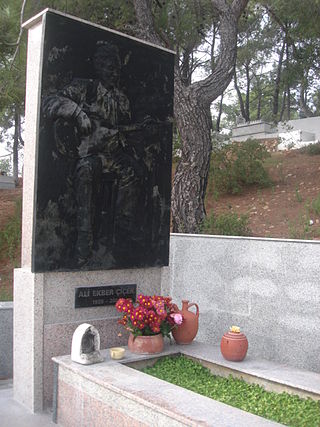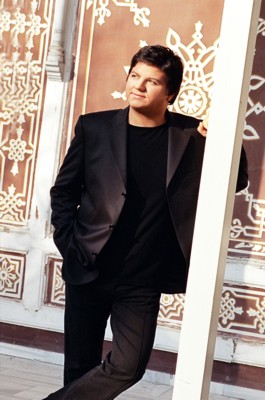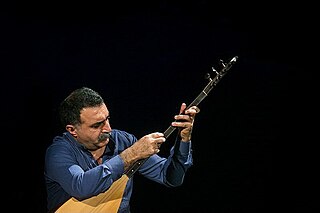Nuray Hafiftaş was known for Idealistic and nationalism for origin world ideology Turkish folk music, Arabesque music, Sufi music, Ottoman music and Azerbaijani music musician, composer, lyricist, arranger, bağlama virtuoso and Ashik of Karapapakh ancestry Azerbaijan Turkish origin.

Neşet Ertaş was a Turkish folk music singer, lyricist, modern ashik and virtuoso of the traditional Turkish instrument the bağlama. His profession in Turkish is known as halk ozanı, which literally means "folk bard". Yaşar Kemal gave Ertaş his nickname, "Bozkırın Tezenesi", writing it in a book he gave him as a gift.

Dudu is a 2003 extended play album by Tarkan. This was his first album to be released through his own record label, HITT Music. It holds five songs and five remixes. The album was published in Europe and Asia. The sales of the album exceeded 4.1 million copies worldwide, of which over 2.5 million were sold in Turkey alone. To support the album, beginning in November 2003 Tarkan gave solo performances in Turkey and other countries. In 2004 as part of Dudu World tour Tarkan visited Austria, Germany, France, United States, Ukraine, Russia, Finland, the Netherlands, Azerbaijan and Kazakhstan.

Turkish folk music is the traditional music of Turkish people living in Turkey influenced by the cultures of Anatolia and former territories in Europe and Asia. Its unique structure includes regional differences under one umbrella. It includes popular music from the Ottoman Empire era. After the foundation of the Turkish Republic in 1923, Turkish President Mustafa Kemal Atatürk ordered a wide-scale classification and archiving of samples of Turkish folk music from around the country, which, from 1924 to 1953 collected around 10,000 folk songs. Traditional folk music was combined with Western harmony and musical notation to create a more modern style of popular Turkish music.

Orhan Gencebay is a Turkish musician, bağlama virtuoso, composer, singer, arranger, music producer, music director, and actor. Gencebay was born in the coastal town of Samsun on 4 August 1944. He is of Crimean Tatar descent. In 1998, he was named a State Artist of Turkey.

An ashik or ashugh is traditionally a singer-poet and bard who accompanies his song—be it a dastan or a shorter original composition—with a long-necked lute in Turkic and non-Turkic cultures of South Caucasus. In Azerbaijan, the modern ashik is a professional musician who usually serves an apprenticeship, masters playing the bağlama, and builds up a varied but individual repertoire of Turkic folk songs.

Ali Ekber Çiçek was a Turkish folk musician.
Haydar Haydar is a well known traditional mystical Turkish folk song. The lyrics of the song come from "a poem by 17th century Alevi-Bektashi poet Kul Nesîmî that vocalizes an internal struggle with God."

Ramazan Kubat, better known as Kubat, is a Turkish folk singer and composer distinguished with his particular style and his applied use of electronic instruments in his songs.

Musa Eroğlu is a Turkish folk musician and bağlama virtuoso.

Erdal Erzincan is a Turkish Alevi folk music musician, composer, and singer. In 1981, he moved to Istanbul and studied bağlama at the Arif Sağ music school in 1985. Since 1989, he has been studying music at Istanbul Technical University. He has conducted research on the selpe method, which is a method for playing bağlama without a plectrum, similar to the tapping method on guitar.
Tolgahan Çoğulu is a Turkish classical guitarist, arranger and designer of the adjustable microtonal guitar. He built a unique repertoire of works for microtonal guitar by arranging Anatolian folk music and Ottoman maqam music and by commissioning the leading and emerging composers. In 2014, he won the 1st prize at the prestigious Margaret Guthman Musical Instrument Competition at Georgia Tech. He also won the jury award at Donizetti Classical Music Awards in 2014.
Hıdır Gürel, better known by his pen name Âşık İbretî, was a Turkish ashik, poet and folk singer. His pen name means "the Exemplary Ashik". His poems were written in the tradition of Turkish Alevi folk poetry.

The Wind is an album by Iranian Musician, Kayhan Kalhor, and Turkish folk Musician Erdal Erzincan that was released by ECM Records in 2006. It was their first collaborative album and The result is a set of instrumental compositions that flow into each other like one continuous work. Kalhor recorded The Wind in Istanbul at November 2004 and mixed it, together with ECM producer Manfred Eicher at Oslo's Rainbow Studio in 2006.

Kula Kulluk Yakişir Mi is a live album by Turkish Musician Erdal Erzincan and Iranian Kamancheh player Kayhan Kalhor, released through ECM Records on 27 August 2013 in the United States.
Events in the year 1993 in Turkey.

Sabahat Akkiray, better known as Sabahat Akkiraz, is a Turkish folk singer and former politician, who was a Member of Parliament for Istanbul between 2011 and 2015 from the Republican People's Party (CHP).
Güler Duman is a Turkish singer, songwriter, composer, TV host and music teacher. She concentrates on Turkish folk music.

Tahtacı are a Turkic people living mainly in the forested areas of Aegean and Mediterranean regions of Turkey. They are alleged to be descendants of the historical Ağaçeri tribe, who are the supposed descendants of the Akatziri tribe that lived north of the Black Sea in the 5th century AD, however, Golden argued that this thesis was not "firmly grounded in anything beyond phonetic resemblance".
Muhlis Akarsu was a Turkish folk singer and Bağlama player. He was killed, along with 34 others, during the Sivas massacre in Sivas, Turkey when a group of Islamist rioters set fire to the hotel where the victims had gathered for the Pir Sultan Abdal festival.












